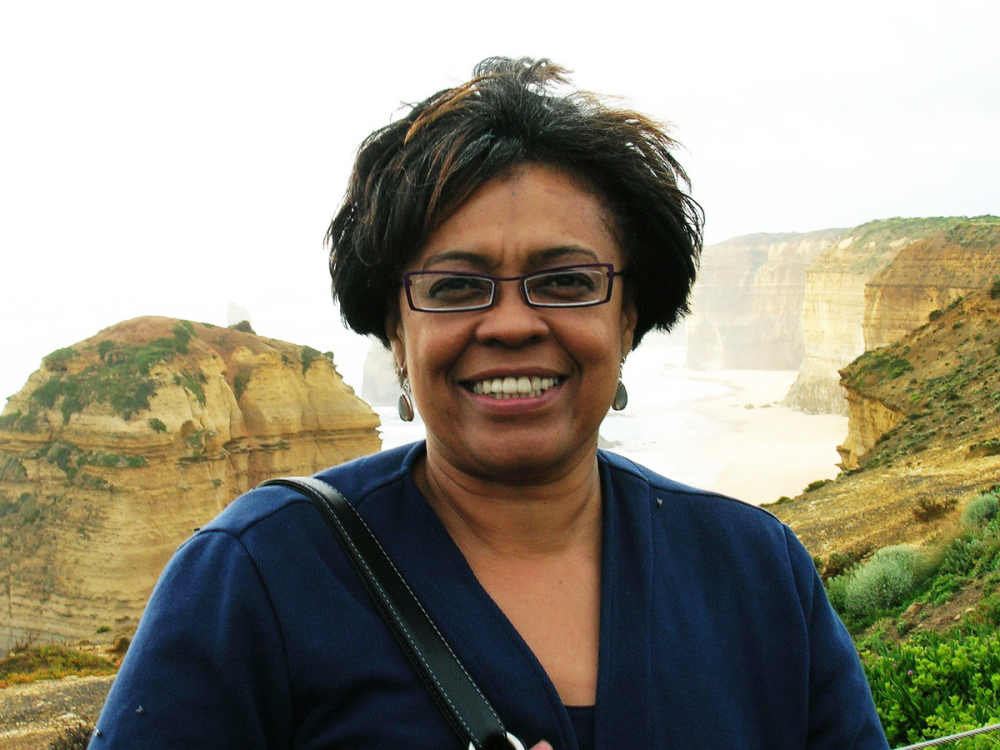Carol Wall was a fierce feminist, trade unionist, anti-racist and social justice activist who spent her entire life making good trouble. She was one of the most important union leaders of her generation and her influence continues to be profound.
Carol died suddenly on April 22. Her passing has left a hole in many hearts and a vacuum across the network of movements she worked tirelessly to build.
She was so well loved.
I come from a proud, social-justice activist, fourth-generation African Canadian family. From an early age I remember being taught not only to stand up for my human dignity, but that I must stand with other marginalized, oppressed groups in solidarity.
— CAROL WALL, "DEAR WHITE SISTERS AND BROTHERS", OUR TIMES, SUMMER 2020
Carol began her career at the Toronto Star. For 17 years, she was active at all levels in her local, in the labour and women’s movements, while raising three warm, strong, and caring children — Jeremy, Jason and Nicole — with Gerry, the love of her life. She was a member of the Southern Ontario Newspaper Guild.
I was working in the finance department and Carol in advertising at the Toronto Star when Ontario passed the Pay Equity Act in 1987. The Star was required to establish a joint union/management committee to develop a pay equity plan.
Carol took on the task to represent her department and encouraged me to do the same. She had more union experience than I and given the enormity of the task I was hesitant. “This will be a satisfying experience we can share, and I will guide you through the process," she said.
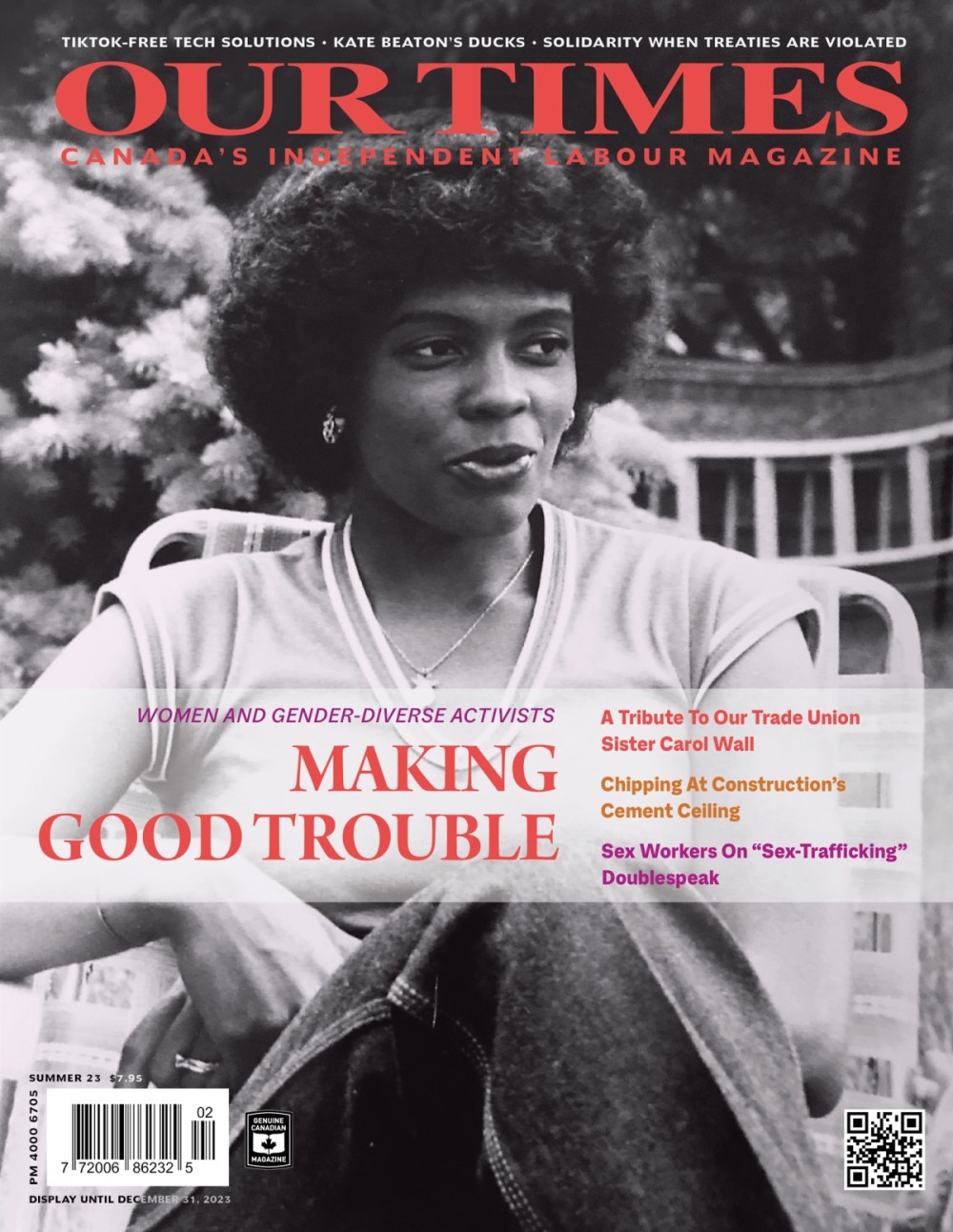
This tribute is the cover story of our Summer 2023 issue. IMAGE: A young Carol Wall discussing, perhaps, some good trouble in the making.
Carol kept her promise; she mentored me, as well as other committee members. Because of Carol’s involvement, we reached an agreement after several months of tough negotiations. Carol was loving, generous, loyal and a tireless crusader for equality. She was a natural-born teacher who had an innate ability to build bridges.
That pay equity experience, along with a little prodding from Carol, inspired me to get more involved with the union. Carol changed my life, and I am forever grateful.
— SYLVIA COWELL
Carol was one of the first Black women activists to raise the issue of including race-based wage discrimination in pay equity legislation. When asked how we would prove such discrimination, she merely stated that it was obvious — look at the cleaning and kitchen staff in any hospital or hotel. While race-based discrimination did not form part of the deliberations on pay equity in Ontario in the 1980s, it was raised by our unions and included in the federal Pay Equity Task Force Report in 2004. Many years later. First raised by Carol Wall.
After many years of local and community activism, Carol was hired as a staff representative with her union, the Communications, Energy and Paperworkers Union of Canada (CEP).
2001, Quebec City: Our union, CEP, took part in the largest anti-globalization demonstration of its time, which opposed the Summit of the Americas decision to establish the FTAA [Free Trade Area of the Americas] agreement. Carol and I were staff representatives. Unbeknownst to us, our contingent was being led to an open field away from the protests, and away from the young activists who were being cornered and confronted by the police. In that field I turned to Carol. “We are out of here,” was all she said. We gathered our delegates and marched right into the thick of the protest. Carol never stood on the sidelines.
— KIM BEEMER
Carol was hired as the first national Human Rights Director for CEP in 2000, working with all of the equality-seeking members in her union and across the movement. She was a member of the Canadian Labour Congress’s Human Rights Committee and worked closely with the CLC Women’s Department planning conferences and campaigns.
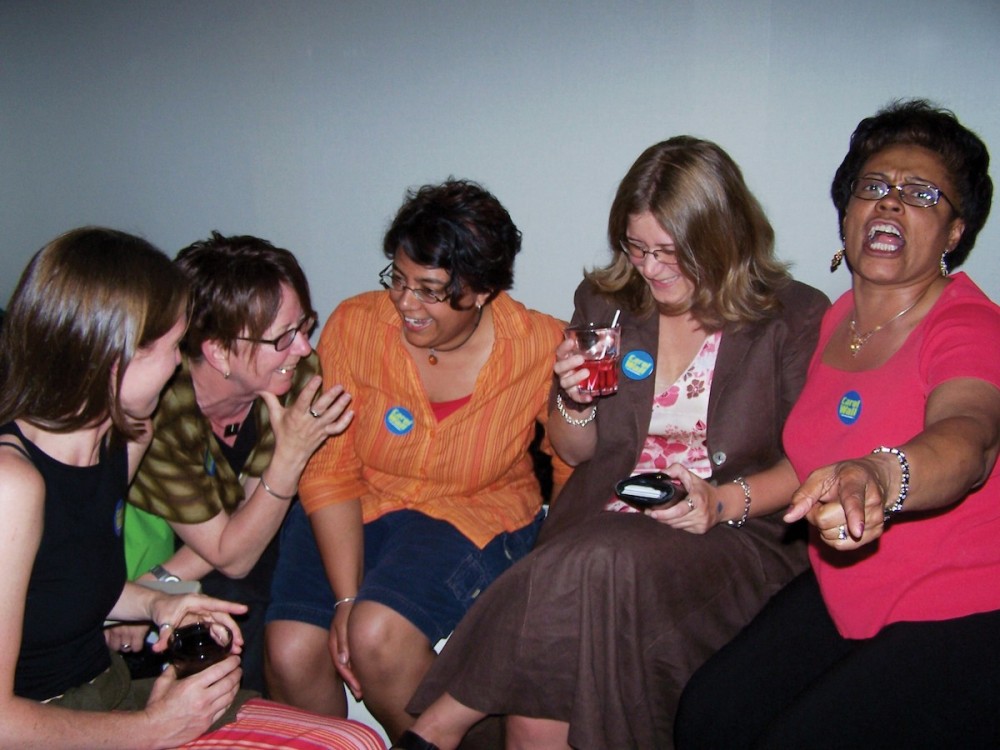
Carol is giving the photographer playful heck for taking this candid photo during a group huddle. From left to right: Karen Dick, Mary Gellatly, Deena Ladd, Stacey Papernick, Carol. PHOTOGRAPH: JOHN MACLENNAN
I met Carol when I was 28 years old. We were brought together by Winnie Ng and Sue Genge to create and teach a new one-week course for the CLC — “Organizing and Bargaining for Women’s Equality.” From the moment I met her I was hooked. Carol was so clear about who she was, the inspiring history of her ancestors who fought slavery and what this meant to her as a Black woman organizing for justice.
I was enthralled with this incredibly strong woman who spoke the truth about the challenges of working in the labour movement as a woman of colour, who talked honestly about power and structures that were not working and how we could do the work differently. We spent a fabulous week together at Port Elgin teaching, mentoring, and challenging participants to think differently, laughing, eating desserts, watching political movies at night and forming a lifelong friendship. She was a mentor and dear friend to me, my family and to so many others.
— DEENA LADD
Carol was the CEP representative on the Canadian Labour Congress delegation to observe the first free elections in South Africa in 2001. In 2002, she was elected as one of the Workers of Colour Vice Presidents on the CLC Executive Council. Carol was also a founding member of CBTU, the Coalition of Black Trade Unionists.
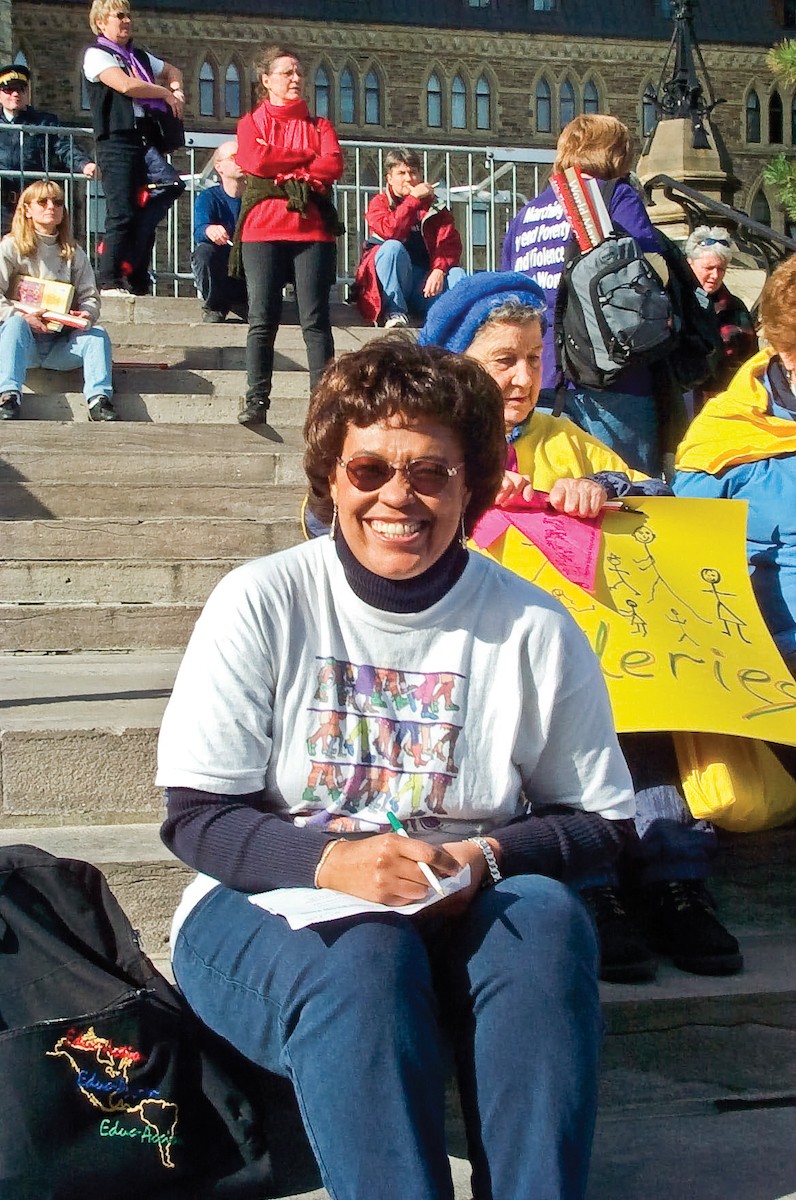
At the World March of Women, in Ottawa, Ontario, in
2000.

At the World March of Women, in Ottawa, Ontario, in 2000.
Carol was a remarkable woman and a friend of mine. She worked for years to challenge and dismantle barriers to full equality. Carol helped found CBTU as part of this work. The Canadian Chapter now has almost 200 members from unions across the country.
When concurrent jurisdiction [unionized employees’ right to file complaints with the Human Rights Tribunal of Ontario (HRTO) or to initiate action through their collective agreement] was threatened, Carol provided expert evidence on behalf of CBTU before the Tribunal. Because of the systemic barriers that Black workers and other Equity-seeking groups encounter in grievance and arbitration processes, it was crucial to maintain the HRTO’s concurrent jurisdiction regarding complaints of racial discrimination. Carol’s testimony reflected her role as an elder and advocate for her community.
— YOLANDA MCCLEAN
In 2004, Carol was hired by the Public Service Alliance of Canada (PSAC) as a national negotiator in Ottawa.
Shortly after getting to the PSAC, Carol drew the short straw and was sent up north to negotiate at a diamond mine. The conditions were horribly repressive. She was stuck on site with constant monitoring. There was even a sensor on her door that would alert the employer if she was entering or leaving her room. One night, Carol opened and closed that door about a hundred times just to mess with their heads. And that’s how she was with all the bosses she faced. A don’t-jerk-me-around hurricane of energy who found ways to rebel in even the most stressful workplaces.
When she got back and ruefully admitted that she hadn’t brought home any diamonds, one of our colleagues told her that we were just glad to have our own diamond back. It wasn’t hokey, or weird or awkward, because that’s how everyone felt about her. We all loved her that much.
— GABY LEVESQUE
In 2005, Carol ran for President of the Canadian Labour Congress on an equality-based militant program, winning a sizeable percentage of the vote. Despite his victory, incumbent Ken Georgetti was furious and stormed out of the convention hall. Carol and her supporters, on the other hand, were jubilant because the campaign showed widespread support for a much more activist labour movement.
Carol Wall was an amazing woman and trade-union activist. I was excited to nominate her for CLC President in 2005. These days I often imagine how different the labour movement and workers' rights in this country would be if she had won that election.
I imagine how her energy, her politics, her feminism, her activism and her intellect would have transformed the CLC. Certainly, all those working on her campaign could imagine it. We were tired of the old-boys network and wanted the CLC to be a more militant, inclusive, activist organization, one that supported affiliates in collective bargaining and in organizing new members. We wanted things to be different and we knew Carol represented that change.
Rank-and-file delegates at that convention could also imagine it. The (mostly white, male) leadership of the major affiliates, other than CUPW and PSAC, endorsed incumbent Ken Georgetti. Despite that, Carol won a stunning 37 per cent of that vote!
We could all imagine what her leadership would have meant for working people. These days I struggle to imagine our movement now without her.
— DEBORAH BOURQUE
Carol’s 2005 run for President of the CLC was inspirational. Her fierce move to dismantle the oppressive and patriarchal structures of the CLC set a course of history that a group of us followed when we supported Hassan Husseini’s run for president and launched the “Take Back the CLC” campaign in 2014. Hassan stepped through the door that Carol had kicked open years before and continued the tradition she started of militant and grassroots campaigning. We were proud to stand on her shoulders!
— RACHEL BESHARAH
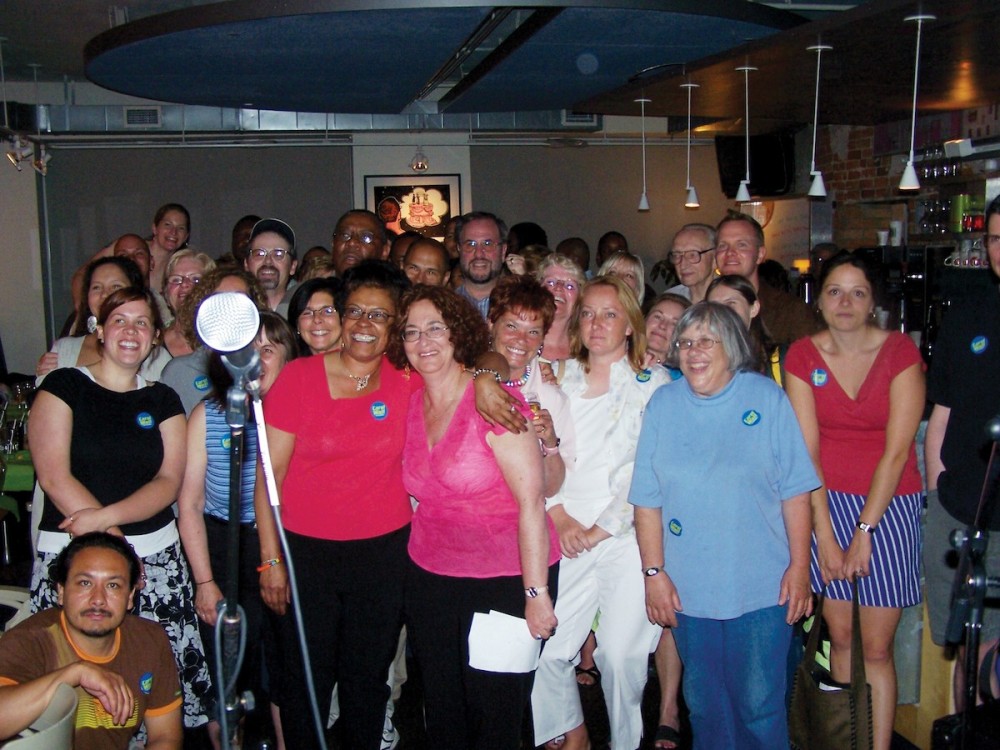
Carol with collaborators and supporters at the 2005 Wall Ball.
When I decided to run for President of the Canadian Labour Congress, I consulted several comrades, colleagues, and close friends. Carol Wall was all of these in one and at the top of the list. Carol never hesitated in her support.
One of the first things Carol said, and repeated often, was “many come to do good but end up doing well.” This was her warning to those who occupy positions of power within the labour movement, not to become complacent and do well for themselves at the expense of their principles. No matter which position Carol occupied, she lived by these words and never forgot her roots or compromised her principles. I learned much from my dear sister and comrade, but these words continue to guide me.
— HASSAN HUSSEINI
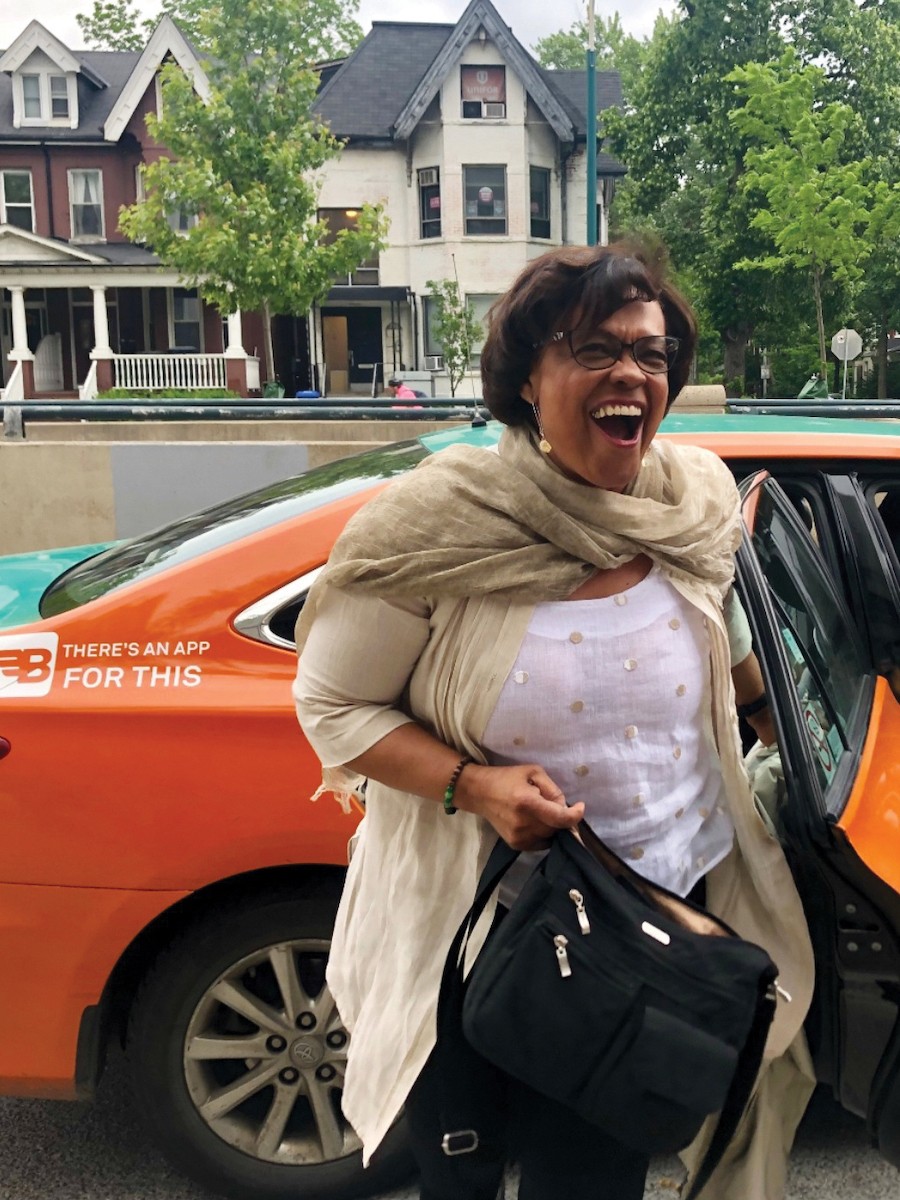
Carol arriving at the Workers Action Centre in Toronto for her surprise retirement party in June 2019.
Carol was actively recruited to the Canadian Federal Mediation and Conciliation Service (FMCS) in 2006 where she eventually became Ontario Director, the first Black person to hold this position.
I also had the opportunity to work with Carol at the Federal Mediation and Conciliation Service as a mediator. Before my first mediation, I called Carol. “You’ve got this. Call if you need me,” she said. Five minutes into the meeting, the union declared they were going on strike and walked out of the room. I called Carol. She burst out laughing, so I started laughing.
"Well, that’s a first,” she said. “It will all work out.” In that moment, she knew that I needed a good laugh, then she talked to me my entire drive home. No matter what was going on in her life, Carol always took your call.
— KIM BEEMER
Always, along with her formal roles, Carol was involved in a multitude of activities to help colleagues, communities, family, and friends.
Carol’s life for social justice was inspired by the story of William Holland, an enslaved ancestor who escaped to freedom. Seen as an act of resistance, social justice took on an immediacy that propelled Carol all her life. She saw unions as part of a movement for social change and challenged entrenched union leadership to be better.
Social justice for Carol was also Indigenous justice. At a conference co-sponsored by the Wahta Mohawks of Ontario and Indigenous communities from the Philippines, Carol was in deep reflection “learning land, unlearning empire, recovering Indigenous roots in a settler colonial diaspora.” Social justice, too, was global justice, so Carol was on the board of Horizons of Friendship, supporting programs for Central America and Mexico.
In her passing, Carol has left an inspiring example so that generations to come will celebrate “runaway slaves” and “troublemakers” — hard-earned badges of honour that Carol carried proudly in her life.
— JOJO GERONIMO
I can’t remember exactly when I first met Carol. It seems forever ago. We got into some good troublemaking within the labour movement, while confiding, laughing our heads off and supporting each other. She was always just a phone call away.
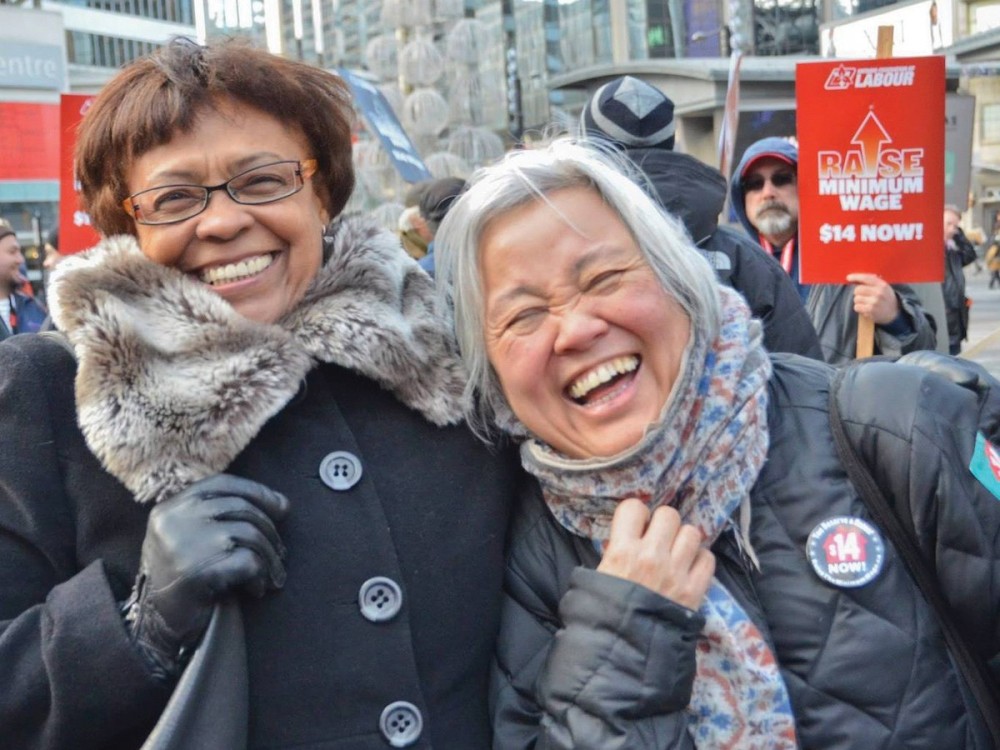
Carol Wall and labour activist Winnie Ng at a UNITE HERE Local 75 demonstration in 2013. PHOTOGRAPH: JOHN MACLENNAN
After her “retirement,” Carol was strategic, creative and bold, making a real impact with several unions who were fortunate to be working with her. Her vision, passion and enthusiasm were always contagious.
In 2001, when we were co-writing a book chapter on labour’s equity practices, Carol taught me words matter. One of her favourite words was co-conspirator.
She urged us to go beyond being an ally or collaborator, to move from performative to transformative action; and to really “walk the talk” in confronting the beast of white supremacy.
There are so many budding projects where Carol planted seeds . . .
Let’s conspire some more, honour Carol’s legacy and continue her unfinished journey!
— WINNIE NG
I met Carol after I was elected as the National President of the Canadian Union of Postal Workers (CUPW). She helped our National Human Rights Committee develop an equity audit.
Carol challenged all of us to come out from our comfort zone and engage in difficult conversations around dismantling the inequalities within workplaces, unions and society. She mentored and inspired so many of us to “take our space” at the decision-making tables and reminded us to check in, to take care of each other.
The conversations with Carol have changed me, making me understand my responsibilities and the importance of self-reflection. I felt supported, heard and not alone.
Our Human Rights Committee members benefited from Carol’s guidance and generosity of spirit. Our equity-audit work continues. Carol has lit a torch, and we must carry on. We can’t thank her family enough for sharing Carol with so many of us.
— JAN SIMPSON
Over the last four years, Carol has been working with the Canadian Union of Public Employees (CUPE) to develop an Anti-racism Action Plan to address the systemic underrepresentation and exclusion of Indigenous, Black and racialized members in the union and beyond.
She has also helped us launch our Women in Leadership Development (WILD) program. This radical leadership program equips Indigenous, Black and racialized women to think and act strategically, and builds capacity to communicate with confidence, take risks and build bridges.
As Carol said, "This program will inspire you to be the creative and courageous leaders the movement needs."
Rest in peace, Sister Wall. You may be gone from our lives, but your legacy lives on in all of us.
— YOLANDA MCCLEAN
With two of her grandchildren, Carol was involved with Kids in the Woods, an organization devoted to getting kids outside and immersing them in nature. As always, Carol made an impact.
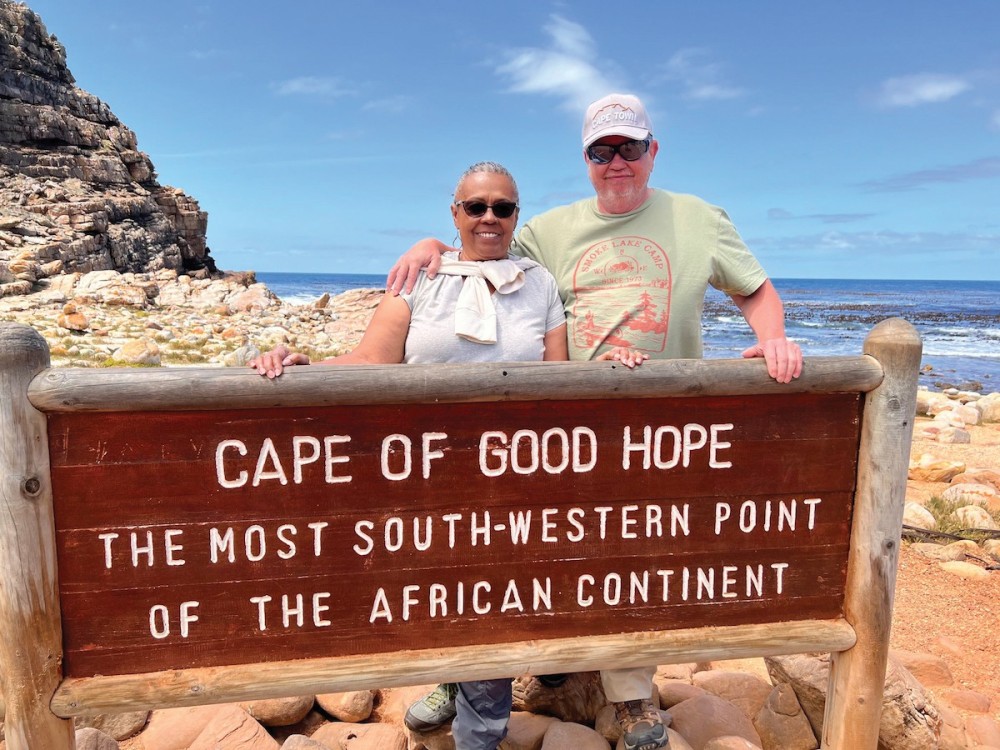
Carol with her partner, Gerry, on their dream trip to South
Africa in 2022.

Carol with her partner, Gerry, on their dream trip to South Africa in 2022.
Yes, for Carol, the place to start was love. Some take love for weakness or sentimentality. But Carol understood the true and immense power of love.
Its depth. Its breadth. Its contours. How love can protect. How love can create. How love saves. How love can invigorate and empower. How love can build anew when all seems lost and in ruins. How it heals.
Carol moved throughout her full and beautiful life with love, because she always had hope. She and I often discussed the cruel history of racism and its current-day impacts on the Black community she loved so much. And whenever I was tempted to lose hope under the weight of the seemingly relentless onslaught of injustices, Carol just wasn’t having any of it. "We can’t give up," she said. "We rest, practise self-care and never let them steal our joy!"
— MARK FROM KIDS IN THE WOODS
I am determined, until I can no longer breathe, to work to leave a “better world” not only for my grandchildren but for all our grandchildren.
— CAROL WALL, "DEAR WHITE SISTERS AND BROTHERS"
And she did.
***
A Family's Tribute to Carol
A LETTER TO MY MOM
I miss you so deeply. I think about you constantly and my heart hurts without you. You were the most incredible human I've ever been blessed to know, and I'm so grateful that I had 44 years to be influenced and guided by your thoughtful, kind and loving ways. You always taught us — my brothers and me, and your grandchildren — to be reflective, to seek justice, to be kind and to commit to making the world a better place. You never let anyone down, and you never left anyone behind. You were a gentle powerhouse in your approach, and your impact on people, globally, will live on forever. I could not ask for a better mom, friend, supporter and hero. Thank you for being my mom; we will see each other again. Fly with the angels.
— YOUR DAUGHTER, NICOLE
Why has my Mother gone?
I can’t hear her raucous laughter. I can’t see her loving face.
I can’t feel her warm embrace.
My Mother is not here anymore, but my Mother is everywhere.
Her energy is in the countless lives she touched.
She is in the kindness of strangers and the laughter of friends.
She is the justice we do and the compassion we show.
She is light. She is warmth. She is love.
My Mother is not gone.
— JASON
***
Our Times would like to thank Sue Genge for all her work as the organizer and writer of this tribute. A friend and co-conspirator of Carol Wall’s from the 1980s on, beginning with the fight for pay equity legislation, Genge has long been active in the women's movement and the labour movement. She was an Employee Member of the Ontario Pay Equity Tribunal and a longtime CUPE activist. In addition to being president of her local at Metro Library in Toronto, she was chair of the CUPE Ontario Division Women’s Committee and a member of the Ontario Federation of Labour Women’s Committee. As part of the Canadian Labour Congress Women’s and Human Rights Department, Genge led the CLC’s work on women’s and 2SLGBTQI+ issues. Genge is also a former Our Times board member.
Special thanks to Kim Beemer for collecting the photographs that accompany this tribute.
If you'd like to share more memories of Carol Wall, please email them to outreach@ourtimes.ca before October 12, 2023, and Our Times will publish them as addenda to this tribute.
If you would like to support the Carol Wall Legacy Fund, please donate to The Ontario Employment Education & Research Centre (OEERC). The OEERC is a charitable foundation that works with grassroots workers' organizations, such as the Workers Action Centre.
You can make your contribution online at oeerc.org, or find information there about how to send OEERC a cheque by mail. Please make sure you indicate that your donation is to be directed towards the Carol Wall Legacy Fund. You will get a charitable tax receipt for your donation.
This article was updated on October 10, 2023 to credit John Maclennan for the use of his photographs and to correct the captions accompanying those photographs. A heartfelt apology to John Maclennan for the earlier oversight.


